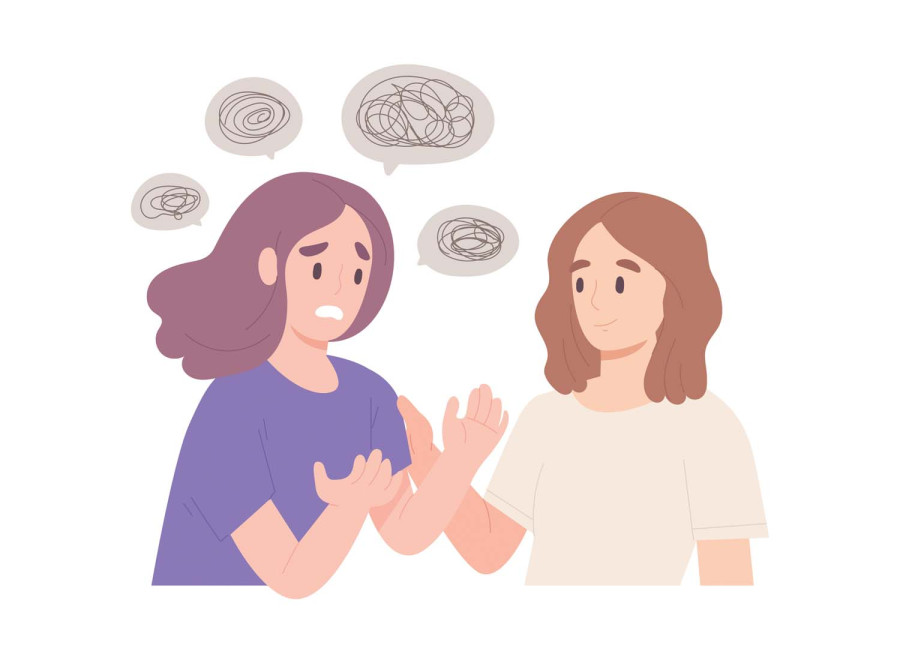Culture & Lifestyle
The healing power of being heard
Emotional sharing is often met with a bombardment of advice, quick fixes, or outright dismissal, when what you need is a compassionate acknowledgement of your emotions.
Dristy Moktan
Have you ever opened your heart to someone, hoping they’d understand what you are going through, only to be met with dismissal, unsolicited advice, or worse, a shift to their own story? It’s a disappointing experience, and unfortunately, a familiar one for many. Moments like these underscore the importance of emotional validation for every individual. We all long to feel heard, seen, and acknowledged, especially when we’re vulnerable.
In Nepali society, the concept of emotional validation remains relatively unfamiliar. As a result, emotional sharing is often met with a bombardment of advice, quick fixes, or outright dismissal, leaving many feeling isolated in their struggles, when what they need is a simple, compassionate acknowledgement of their emotions.
So, to make things clearer, let’s break emotional validation down in simple terms. At its core, it’s about acknowledging, accepting, and affirming someone’s feelings without rushing to offer solutions or pass judgment. Emotional validation doesn’t mean agreeing with everything someone feels, but letting them know their emotions are understandable based on their experiences or perspective.
There may be times when a person’s actions seem misguided. But when someone opens up emotionally, the best we can do is hold back the urge to fix and instead provide a safe space where their feelings are heard and respected.
It’s the difference between saying “You’re overreacting,” versus “I can see why that would upset you.”
While the need to feel seen, heard, and understood is universal, emotional validation is not something we’re born with. It’s a skill we learn through early experiences and the environment in which we grow up. When a child’s feelings are acknowledged and respected, they are more likely to develop a strong sense of self-worth and emotional awareness. Simple acts, like a parent saying, “I can see you’re sad because your toy broke,” teach a child that their feelings matter. Over time, this fosters empathy, better self-expression, and stronger emotional resilience.
However, when children frequently hear phrases like “stop crying” or “be strong,” they may feel that their emotions are wrong or should be hidden. This makes teaching emotional validation early essential, not just for a child’s well-being, but to build a more emotionally aware and compassionate society.
Even as adults, the absence of emotional validation can leave a lasting mark. Invalidation, whether through dismissal, criticism, or ignorance, may not always be obvious, but it subtly shapes how we perceive ourselves and interact with others. Over time, it can lead to shame, self-doubt, anxiety, and even depression. The good news is it’s never too late to learn. By making space for validation in our daily conversations and relationships, we begin to experience its lasting impact.
One of the most powerful outcomes is a stronger sense of self-worth. When our feelings are acknowledged, we feel accepted and valued. This sense of being seen deepens our bonds with others, building emotional safety and trust. It also supports emotional regulation, enabling us to manage intense emotions more effectively and calmly. Over time, consistent validation nurtures empathy, allowing us to step into others’ shoes and connect with their experiences.
Emotional validation doesn’t have to be a grand gesture; it lives in everyday moments. It’s in how we respond to a friend after a rough day, a child who is disappointed, or a partner who has been hurt.
For instance, saying to a friend, “That sounds tough. I can’t imagine how overwhelming that must have felt,” reminds them they’re not alone. Telling a child, “It looks like you’re frustrated that your blocks keep falling. I’d feel that way too. It’s okay,” helps them feel understood. And gently telling a partner, “I get why you felt hurt when I forgot our plan. I’m sorry, it makes sense you’d feel that way,” builds emotional safety in the relationship. These small yet meaningful responses convey a powerful message: ‘I hear you, I respect your feelings, and you matter.’
So, how do we build this skill in our day-to-day lives?
First, listen to understand, not just to reply, because sometimes the best support is simply being present. Then, acknowledge the emotion. Even if you can’t fully relate, saying, “It makes sense that you’d feel that way,” shows empathy. Avoid rushing to solutions; validate before moving to problem-solving. Additionally, reflecting what you hear, such as saying “You’re feeling frustrated because…,” helps someone feel truly seen. Most importantly, be mindful of your words. Phrases like “calm down” or “don’t cry” may seem harmless, but can unintentionally dismiss someone’s feelings.
Emotional validation isn’t just something we need from others; it’s also a skill we can offer ourselves. Self-validation means recognising our feelings without shame or judgment. It is gently reminding us, “It’s okay to feel this way,” even when the world says otherwise.
In a world that often rewards quick fixes and values productivity over presence, we sometimes forget the quiet strength of acknowledging someone’s feelings. Emotional validation doesn’t cost anything, yet its impact can be profound. It builds trust, strengthens relationships, and becomes the foundation for emotional well-being.
So the next time someone shares their heart with you or you find yourself overwhelmed with your own emotions, simply ask yourself: Am I offering understanding, or am I rushing to correct, dismiss, or solve? Because in the end, the way we respond to emotions, whether it’s our own and others’, shapes the kind of relationships we build and how we take care of ourselves.
Now it’s on us. Are we creating a safe space, or just another reason for someone to stay silent?




 12.99°C Kathmandu
12.99°C Kathmandu

.jpg&w=200&height=120)













